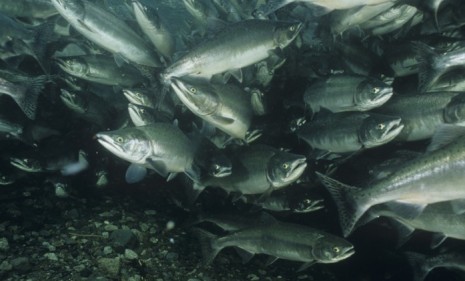Genetically modified fish: Safe to eat?
The FDA may soon declare genetically modified salmon fit for human consumption. Is that a good idea?

A free daily email with the biggest news stories of the day – and the best features from TheWeek.com
You are now subscribed
Your newsletter sign-up was successful
The Food and Drug Administration is on the verge of declaring that genetically modified salmon is safe to eat, which would make the fish the first genetically altered animal approved for human consumption. The AquAdvantage salmon is a traditional Atlantic strain with an added "antifreeze" gene from the eel-like ocean pout and a growth hormone adapted from Chinook salmon. AquaBounty, the company that engineered the salmon, says it looks and tastes like Atlantic salmon, though it grows much faster. If the FDA says it's safe, is there any reason not to eat it?
This could be an environmental disaster: If genetically engineered salmon escape from farm pens into the open ocean, they could wipe out slower-growing wild salmon in a flash, says Kristen Michaelis at Food Renegade. And this is just the beginning — AquaBounty is working on altered trout, tilapia, pigs, and cows. This frankenfish is "bad news," so, if you care about the environment, join the 31 advocacy groups that have written the FDA urging it to say no.
"Genetically modified salmon and other abominations"
The Week
Escape your echo chamber. Get the facts behind the news, plus analysis from multiple perspectives.

Sign up for The Week's Free Newsletters
From our morning news briefing to a weekly Good News Newsletter, get the best of The Week delivered directly to your inbox.
From our morning news briefing to a weekly Good News Newsletter, get the best of The Week delivered directly to your inbox.
Done right, this could be a godsend: Set aside the "ick" factor, and there's no reason to turn up your nose at genetically modified salmon, says Marni Soupcoff at Canada's National Post. Genetically modified crops have been "a boon for efficient food production and a health non-issue," and GM animals can be, too. With proper care and monitoring, these fish can be a "lucky gift" that could feed millions of hungry people, "rather than as a scourge to be squelched with regulation and boycotts."
"Don’t be afraid. Embrace the frankenfish"
It's a matter of time before GM meat lands on your plate: Like it or not, genetically modified animals are coming, says Barb Kiser at Nature.com. After 10 years of study, the FDA has said it's ready to start approving genetically modified animals "for the human table." And AquAdvantage salmon were engineered to be sterile, so fears of interbreeding with wild or other farmed salmon probably won't stand in the way. The approval process will take time, but these franken-salmon should start showing up on U.S. grills in about 18 months.
"GM salmon may be on US menus in 18 months"
A free daily email with the biggest news stories of the day – and the best features from TheWeek.com